Overdue, returned, and missing: the changing stories of Boston's Chinatown Branch Library
Author(s)
Mehta, Aditi, Ph. D. Massachusetts Institute of Technology
DownloadFull printable version (26.13Mb)
Alternative title
Changing stories of Boston's Chinatown Branch Library
Other Contributors
Massachusetts Institute of Technology. Dept. of Urban Studies and Planning.
Advisor
Lawrence J. Vale.
Terms of use
Metadata
Show full item recordAbstract
In 1896, the Boston Public Library (BPL) opened a reading room on Tyler Street in between the South End and Chinatown. Since then, the library has disappeared and reappeared in various forms in Chinatown for different reasons. In 1956, the City of Boston demolished the Tyler Street Branch Library and since 2000, community groups in Chinatown have been advocating for their own branch of the BPL. This thesis explores why the Chinatown community does not have a library in 2010 and why the movement to reclaim one has gained momentum in the past ten years. The purpose of this thesis is to demonstrate that the public library is a diagnostic window into society; the building, its operations, and the services it provides reflect the social, economic, and political contexts of time and place. This research demonstrates that the story of Boston's Chinatown Branch Library is more than just a historical account of a building or concept; it is actually a story about the development of a neighborhood, the preservation of culture and identity, as well as the growth of coalitions and divisions. At first, the addition or removal of the library in Chinatown was largely an extension of city policy, and eventually the presence of a library in the neighborhood became an extension of grassroots community movements. The history of the Chinatown Library mirrors the changing attitudes towards community development in the United States. While reflecting on this chronology, this thesis aims to answer the following questions: What does the library mean to the Chinatown community? What do these meanings tell about the needs of this neighborhood? And, what is the role of a branch library in fulfilling these needs in the contemporary context? The Chinatown Library means different things to its various providers and users. Through archival research and interviews with city officials, library administrators, community members, and other stakeholders, this thesis theorizes that Boston's Chinatown Library has six meanings: 1) Assimilation Processing Center; 2) Gathering Place; 3) Economic Training Ground; 4) Ethnic Identity Assertion; 5) Turf Defense; and 6) Political Clout Building. This research analyzes the decision-making processes of the BPL in 2010 and discusses how and why stakeholders should incorporate library meanings into these processes. Lastly, this thesis provides recommendations and insights for moving forward to all the major players of the Chinatown Library movement.
Description
Thesis (M.C.P.)--Massachusetts Institute of Technology, Dept. of Urban Studies and Planning, 2010. Cataloged from PDF version of thesis. Includes bibliographical references (p. 137-146).
Date issued
2010Department
Massachusetts Institute of Technology. Department of Urban Studies and PlanningPublisher
Massachusetts Institute of Technology
Keywords
Urban Studies and Planning.